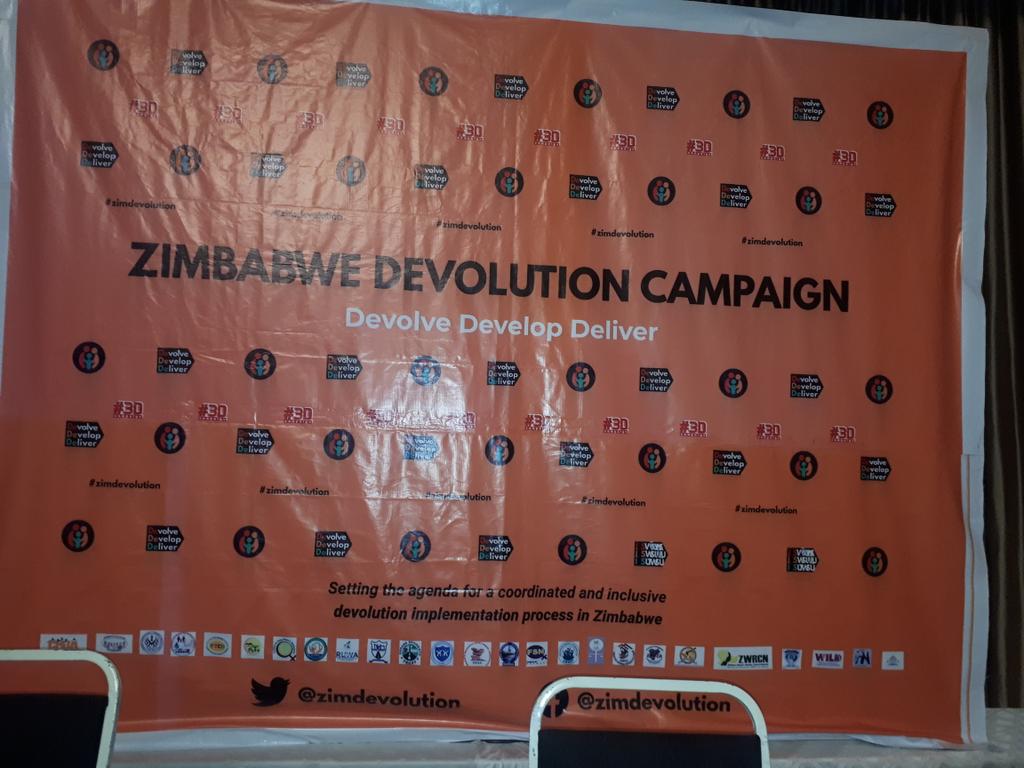By Lloyd Takawira
LOCAL civil societies have blamed governments’ lack of zeal in fully implementing the devolution agenda contained by Chapter 14 of the constitution of Zimbabwe Amendment No.13.
This follows a “Devolution Indaba” held in Harare under the theme “Setting the Agenda for a coordinated and inclusive devolution implementation process in Zimbabwe” hosted by Combined Harare Residents Association (CHRA).
Participants were drawn from fellow residents organizations as well as civil society organizations representing various interest group’s who agreed that government was stalling the devolution process.
Speaking at the Indaba , local government expert, David Matumbike presenting on the Local Government Status, said that despite government rhetorical statements glossing over it’s full support for the Devolution agenda there is little progress on the ground.
He sighted the proposed constitutional amendment no.2 as an attempt by government to scuttle the full implementation of the Devolution agenda.
“The Constitution Amendment No.2 is seeking to re-centralize and goes against devolution. The bill proposes 27 omnibus amendments and 30 minor amendments. Key among them being that it re-centralizes in the office of the President and cabinet”.
Matumbike went on to argue that governments efforts on devolution are “not inclusive”.
“We need to be clear where we don’t agree on devolution, plus govt efforts are not inclusive, its difficult to approach ministerial taskforce chaired by the President .The struggle for strengthening of local government institutions in Zimbabwe should be understood with context of the repeated efforts of patiently engaging and convincing the center that decentralization through,” he said.
Despite the Devolution agenda being spelt out in the constitution on chapter 14, there are other reclusive provisions in the chapter that are working against the full implementation of Devolution agenda.
“While Chapter 14 of the Constitution forms the bedrock of devolution provisions many parts of the constitution are littered with provisions. For example, Section 3 speaks of the founding values and principles, section5 tiers of government section 301, allocation of revenues between provincial and local ties of government that recognize and solidify the devolution.
“The disbursement of intergovernmental fiscal transfers in the name devolutions funds citing section 301(3) of the constitution that stipulates that not less than 5% of total government income”.
Speaking at the same occasion another panelist Sandra Zenda from the Young Women Institute bemoaned the inadequate information on the Devolution agenda and lack of an independent taskforce to fully communicate and implement devolution as the major drawbacks in the full implementation of the process.
“Devolution should help to democratize space enable people to participate. There is lack of information which prevent citizens participation, the devolution structures should address this gap. There should be independent task forces that include full and effective participation of communities especially marginalised groups,” she said.
She added that inn provinces such as Mashonaland Central, devolution meetings have been turned into political rallies.
“We found that in Mashonaland Central Devolution was being politicized, meetings on devolution were being attended by people from one party and it was only one party that was talking about Devolution.”
Zenda said in their survey they discovered that the people in that province did not understand what devolution is, hence she said there is need to concertize people on the importance of a devolved system of governance.
“In Mashonaland Central, we first looked at understanding of Devolution did they know what devolution was, so we found out that they knew the meaning of the word but differed on definition but generally there was no understanding of Devolution. There was limited understanding of the deeper meeting of Devolution and the modalities of Devolution. All the districts received the DEVOLUTION funds,” she said.
Zenda added that devolution should also be a conduit for women empowerment.
“The devolution process should promote gender transformation anchored on the effective participation of young women in structures that determine development priorities. Devolution should be designed and implemented in a way that ensures the creations of new business opportunities and lower costs resulting in decentralization.”
The devolution agenda objectives was also to provide a platform for sharing findings of Devolution work in Zimbabwe, identifying gaps and opportunities on devolution interventions as well as understanding the gender dynamics on devolution saw participants agreeing that , the intention to remove sitting members of parliament from the provincial councils was welcome to address the issues of double standards.
“The constitution S273(1) provides for the establishment of Provincial and Metropolitan Councils through an Act of Parliament. The intention to remove MPs from Provincial Councils is okay in principle because of conflict of interest,” concurred Zenda and Mutimbike
